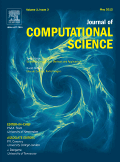
Journal of Computational Science
Scope & Guideline
Fostering Interdisciplinary Dialogue in Computational Research
Introduction
Aims and Scopes
- Computational Methodologies:
Focus on the development and application of new computational methodologies, including numerical methods, optimization algorithms, and simulation techniques that enhance problem-solving capabilities in various scientific fields. - Interdisciplinary Applications:
Encourages research that applies computational techniques to a wide range of disciplines such as physics, biology, engineering, and social sciences, promoting interdisciplinary collaboration and knowledge sharing. - Data-Driven Approaches:
Highlights the importance of data-driven methodologies, including machine learning and artificial intelligence, in enhancing computational models and simulations for predictive analytics and decision-making. - Robustness and Efficiency:
Emphasizes the development of robust and efficient algorithms that can handle large-scale datasets and complex systems, ensuring accuracy and reliability in computational outcomes. - Real-World Problem Solving:
Aims to bridge the gap between theoretical computational science and practical applications, addressing real-world challenges through innovative computational strategies.
Trending and Emerging
- Machine Learning and AI Integration:
There is a significant uptick in research that integrates machine learning and artificial intelligence into computational science, reflecting the growing importance of data-driven approaches in enhancing model accuracy and predictive capabilities. - Hybrid Computational Models:
Emergence of hybrid models that combine traditional numerical methods with machine learning techniques, offering innovative solutions to complex, real-world problems across various domains. - Real-Time Data Processing:
A trend towards the development of computational frameworks capable of processing and analyzing real-time data, particularly in fields like IoT, healthcare, and environmental monitoring. - Complex Systems Simulation:
Growing interest in the simulation of complex systems, including multi-agent systems and network dynamics, showcasing the need for advanced computational techniques to understand intricate interactions within systems. - Sustainability and Environmental Modeling:
An increasing focus on computational models that address sustainability challenges, including climate change and resource management, reflecting global research priorities and funding trends.
Declining or Waning
- Traditional Numerical Methods:
There is a decreasing focus on classical numerical methods that have been well-established over the years, as researchers are increasingly looking for more innovative, hybrid, or machine learning-based approaches. - Basic Statistical Techniques:
The application of basic statistical techniques in computational studies appears to be waning, as more complex data analysis and machine learning methods become the norm for handling data-driven research. - Single-Domain Focus:
Research that focuses solely on a single domain without interdisciplinary collaboration is becoming less common, as the journal encourages more integrative approaches that combine insights from multiple fields. - Static Models:
The reliance on static models without considering dynamic changes or real-time data integration is declining, as there is a growing emphasis on adaptive and responsive computational frameworks. - Standard Optimization Algorithms:
Interest in traditional optimization algorithms is diminishing as researchers seek to explore more advanced, hybrid, and adaptive optimization techniques that better address the complexities of modern computational challenges.
Similar Journals
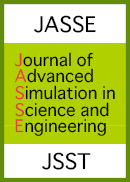
Journal of Advanced Simulation in Science and Engineering
Pioneering Insights in Computational Modeling and BeyondJournal of Advanced Simulation in Science and Engineering, published by the Japan Society for Simulation Technology (JSST), stands as a pivotal platform in the dynamic field of simulation technology, focusing on cutting-edge research and applications in science and engineering. With the ISSN and E-ISSN of 2188-5303, this journal aims to disseminate high-quality research that drives innovation and enhances understanding among practitioners, academics, and students alike. As an essential resource for those engaged in simulation methodologies, it explores a wide range of topics, including but not limited to computational modeling, virtual simulations, and their applications across various engineering disciplines. The journal is indexed in prestigious databases, aiming for a strong impact factor that reflects its commitment to scholarly excellence and relevance. Its open access policy further facilitates wider dissemination and accessibility of research findings, thereby fostering greater collaboration and advancement in the field. Researchers and professionals are encouraged to contribute their findings and insights, establishing the Journal of Advanced Simulation in Science and Engineering as a leading authority in advancing simulation technologies for future applications.
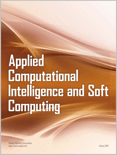
Applied Computational Intelligence and Soft Computing
Innovating Solutions through Computational IntelligenceApplied Computational Intelligence and Soft Computing, published by HINDAWI LTD, is a premier open access journal that has been disseminating critical research since 2009, focusing on the intersection of artificial intelligence and soft computing. With an impressive array of quartile rankings in 2023, including Q2 in Civil and Structural Engineering and Computational Mechanics, this journal has established itself as a significant contributor to the fields of computer science and engineering. Based in Egypt, it plays a vital role in advancing knowledge by providing researchers, professionals, and students with easy access to high-quality studies. The journal’s rigorous peer-review process ensures that only the most impactful research is highlighted, making it an essential resource for those looking to stay abreast of the latest innovations and methodological advancements in applied computational intelligence. Its Scopus rankings further affirm its influence and reputation within the academic community, exemplifying its commitment to facilitating collaboration and fostering intellectual discourse in various scientific domains.

Mathematical Foundations of Computing
Innovating the Future through Mathematical FoundationsMathematical Foundations of Computing, published by the American Institute of Mathematical Sciences (AIMS), is a distinguished open-access journal that has been actively disseminating influential research in the fields of Artificial Intelligence, Computational Mathematics, Computational Theory and Mathematics, and Theoretical Computer Science since its inception in 2009. With its E-ISSN 2577-8838, this journal is committed to providing researchers and practitioners with cutting-edge mathematical theories and methodologies that underpin modern computational practices, which is critical for advancing the field. The journal proudly holds a Q3 categorization in several relevant domains as of 2023, reflecting its contribution and accessibility amid an evolving academic landscape. By offering open access to its content, it ensures that vital research is freely available to a global audience, enhancing collaboration and innovation. Positioned in the heart of the United States, Mathematical Foundations of Computing serves as a crucial resource for advancing knowledge and fostering discussions among researchers, professionals, and students passionate about the mathematical underpinnings of computing.

Journal of Computational Methods in Sciences and Engineering
Advancing Computational Frontiers in Science and EngineeringWelcome to the Journal of Computational Methods in Sciences and Engineering, published by IOS PRESS in the vibrant academic landscape of the Netherlands. With a dedicated focus on advancing the application of computational techniques across various domains, this journal serves as a vital platform for researchers, professionals, and students alike. Although it resides in the Q4 category across key disciplines such as Computational Mathematics, Computer Science Applications, and Engineering, the journal aims to foster innovation and disseminate emerging trends in computational methodologies. Despite its current ranking, the journal’s mission is to facilitate a dialogue on pioneering approaches and their practical implications, supporting the growth and evolution of computational sciences. With a publication history that spans from 2001 to 2024, we invite contributions that reflect scientific rigor and creative solutions to complex engineering challenges, reinforcing our commitment to bridging theory and practice in this dynamic field.
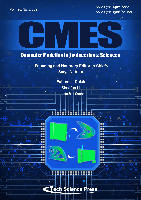
CMES-COMPUTER MODELING IN ENGINEERING & SCIENCES
Empowering Innovation through Modeling & SimulationCMES-COMPUTER MODELING IN ENGINEERING & SCIENCES is a premier journal published by Tech Science Press, dedicated to advancing knowledge in the fields of computer science applications, modeling and simulation, and software engineering. With an impressive convergence of research from 2000 to 2024, this journal stands out as a vital resource for researchers, professionals, and students alike, fostering innovation and collaboration in computational methodologies. The journal currently holds a Q3 category ranking in multiple disciplines according to the latest metrics, including Scopus, which reflects its growing significance in the academic community. By providing a platform for high-quality research and open discourse, CMES aims to enhance the understanding of complex systems through effective modeling techniques and computational tools. Despite its current classification under open access, the journal remains a cornerstone for those looking to deepen their expertise in cutting-edge computational engineering and science.

International Journal of Mathematics and Computer Science
Advancing the Frontiers of Mathematics and Computer ScienceThe International Journal of Mathematics and Computer Science (ISSN: 1814-0424, E-ISSN: 1814-0432), published by Lebanese University, serves as a vital platform for disseminating innovative research and advancements in the fields of mathematics and computer science. With a compelling range of topics including Algebra, Applied Mathematics, Computational Mathematics, and Statistical Analysis, this journal caters to a broad audience of researchers, professionals, and students. Spanning the years from 2017 to 2025, it has established a presence in several key quartiles, including Q3 rankings in Applied Mathematics and Computational Mathematics, and a Q4 ranking in Algebra and Number Theory. While currently not an open-access journal, it provides valuable insights through its rigorous peer-reviewed process, enhancing its relevance in both theoretical and applied domains. Furthermore, its presence in Scopus rankings reflects its commitment to quality, making it an essential resource for anyone looking to explore the intersection of mathematics and computer science.
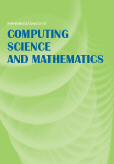
International Journal of Computing Science and Mathematics
Charting New Territories in Computational Theory and PracticeThe International Journal of Computing Science and Mathematics, published by INDERSCIENCE ENTERPRISES LTD, is a pivotal platform for the dissemination of cutting-edge research in the intertwined disciplines of computing science and mathematics. With an ISSN of 1752-5055 and an E-ISSN of 1752-5063, the journal primarily serves the academic community engaged in applied mathematics, computational mathematics, theoretical computer science, and more, making significant contributions that resonate across various fields of technology and science. While the journal is currently categorized in the Q4 quartile for multiple related fields, including Applied Mathematics and Computational Theory, it continues to strive towards advancing the knowledge and practice within these areas. Spanning years from 2007 to 2010 and again from 2012 to 2024, the journal seeks to publish high-quality, peer-reviewed articles that not only address theoretical advancements but also explore practical applications of computing science in mathematical contexts, thereby fostering collaboration among researchers, professionals, and students alike. Please note that this journal is not available as Open Access, thus ensuring a curated content selection intended for dedicated research communities.
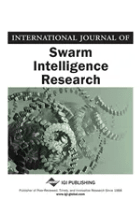
International Journal of Swarm Intelligence Research
Unveiling Insights in Swarm Intelligence ResearchInternational Journal of Swarm Intelligence Research, published by IGI Global, stands at the forefront of research in the dynamic field of artificial intelligence, focusing specifically on swarm intelligence and its applications. With an ISSN of 1947-9263 and an E-ISSN of 1947-9271, this journal has carved a niche within academia since its inception, boasting a commendable Q3 rank in the categories of Artificial Intelligence, Computational Theory and Mathematics, and Computer Science Applications as of 2023. The journal spans vital research from the years 2017 to 2024, fostering an environment that welcomes innovative studies that apply natural systems principles to computational methodologies. Although not classified as Open Access, the journal remains accessible to a broad audience, providing vital insights and fostering discussion among researchers, professionals, and students delving into cutting-edge swarm intelligence topics. As such, this journal is an essential resource for those aiming to advance their understanding and application of these transformative technologies.

EURO Journal on Computational Optimization
Unlocking Innovative Solutions in Optimization ScienceEURO Journal on Computational Optimization, published by ELSEVIER, is a leading open-access journal that has been advancing the field of computational optimization since its inception in 2013. Catering to a diverse audience of researchers, professionals, and students, this journal addresses critical developments in computational mathematics, control and optimization, and management science. With an impressive Q1 category ranking in multiple areas, including Computational Mathematics and Management Science and Operations Research, the journal serves as a pivotal platform for disseminating groundbreaking research and innovative methodologies. Its commitment to open access ensures that valuable insights are readily available to the global academic community. With a continuous publication timeline through 2024, the EURO Journal on Computational Optimization is positioned at the forefront of its field, fostering collaboration and innovation in optimization techniques and applications.
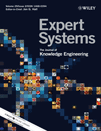
EXPERT SYSTEMS
Transforming Ideas into Impactful Intelligent Systems Research.EXPERT SYSTEMS is a prestigious journal published by WILEY, dedicated to advancing the fields of Artificial Intelligence, Computational Theory and Mathematics, Control and Systems Engineering, and Theoretical Computer Science. Established in 1984, this journal has consistently provided a platform for rigorous research, showcasing innovative methodologies and applications that drive the future of intelligent systems. With an impressive impact factor and Scopus rankings placing it among the top quartiles within its categories, EXPERT SYSTEMS is a vital resource for researchers, professionals, and students seeking to deepen their understanding of complex systems and their applications. The journal is not currently an Open Access publication, emphasizing its commitment to high-quality, peer-reviewed research that impacts the global academic community. With a convergence year extending to 2024, it prepares to continue its legacy as a cornerstone of knowledge in these dynamic fields.